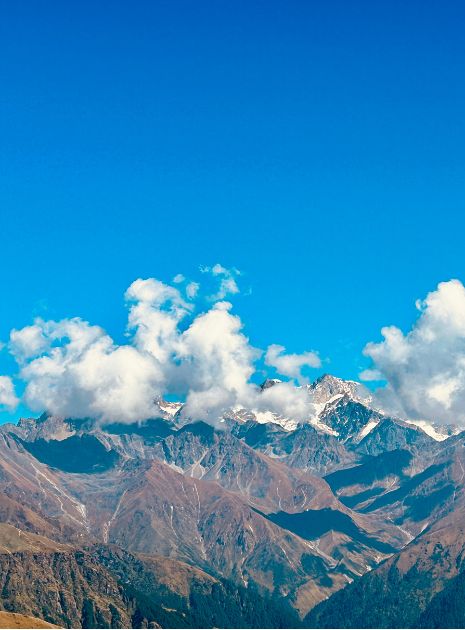Chakrata
Chakrata isn’t the type of place that shouts to be seen. It just sits quietly among pine forests and rolling hills, doing what it’s continually accomplished — letting the clouds pass, the birds sing, and existence move slowly.
Chakrata isn’t the type of place that shouts to be seen. It just sits quietly among pine forests and rolling hills, doing what it’s continually accomplished letting the clouds pass, the birds sing, and existence move slowly.
Tucked within the Dehradun district of Uttarakhand, this small city is around two hundred meters above sea level. It became once a British cantonment (छावनी), and some of that calm nonetheless lingers. The streets are slender. The stores are few. But the silence it’s deep, easy, and full of that means.
Life in Chakrata doesn’t start with honks or alarms. It begins with the rustle of wind in the deodar (देवदार) trees. With the odor of wooden smoke curling out of chimneys (चिमनी). With footsteps on stone paths as kids walk to high school, their uniforms slightly crumpled, their cheeks pink from the bloodless.
Women carry steel pots to accumulate water. Men head closer to the terraced fields with gear in hand. And antique folks sit within the solar outside their homes, sipping tea and watching the world skip with the aid of, one quiet second at a time.
The British selected Chakrata for a cause. Cool climate, clean air, and a location a long way from chaos. They left in the back of a few colonial homes, old wood fences, and huge porches in which you can nevertheless sit down with a cup of chai and listen not nothing but the wind.
But Chakrata didn’t grow fast like Mussoorie or Nainital. It didn’t chase tourists. It didn’t replace trees with malls. Maybe that’s why it still feels untouched. Real. Like it remembers what life was before speed became a habit.
The Jaunsari (जौनसारी) people have lived here for generations. They know the slope of every hill, the shade of every tree. Their homes are built of stone and timber, warm in winter and cool in summer. Their festivals are loud with drums (ढोल), colorful clothes, and dances that tell old stories.
Women wear silver ornaments passed down from grandmothers. Men play traditional instruments. Their food is simple and strong mandua (रागी) rotis, bhatt ki churkani (black soybean curry), and seasonal greens from their own fields.
It’s not nostalgia. It’s survival. And it works.
If you visit Chakrata, don’t expect big hotels or neon lights. Instead, you’ll see:
You won’t see traffic jams. You won’t hear loudspeakers. And you definitely won’t find a pizza joint on every corner. But you will find peace. And that’s harder to come by.
Chakrata doesn’t have many “tourist spots,” but it has walks. And these walks give more than any guidebook ever will.
One popular trail leads to Tiger Falls (तिगरफॉल्स) not the biggest, but powerful and clean, hidden in a dense forest. Another goes to Deoban (डोबन), a patch of forest so green and silent you can hear your own thoughts.
Ask a local, and they might point you to a nameless trail. Just follow it. You’ll find birds, wildflowers, maybe a barking deer (काकड़), and definitely silence.
Monsoon in Chakrata is something else. The clouds roll in like old friends. Roads turn slippery. Roofs leak a little. But no one complains. People just adjust.
They know nature comes first. Always has. Always will. So when it rains, they slow down, drink extra tea, and wait it out.
Living in Chakrata isn’t easy. The roads break often. Hospitals are far. Schools are basic. And many youngsters leave for bigger cities in search of jobs. Some don’t come back.
But those who stay they stay because this is home. Their roots go deep. Their crops grow here. Their gods live here. And their parents are still sitting on that same porch, waiting for the kettle (ketli) to boil.
Some families have started homestays, not to get rich, but to share what they have a bed, a view, a way of life. You won’t find hotel menus. You’ll get what they’re eating maybe mandua roti and saag. And that’s the point.
In a world running on notifications and deadlines, Chakrata offers a rare lesson: Slow is okay. Quiet is powerful. And sometimes, just sitting under a tree is enough.
It reminds us that growth doesn’t mean glass towers. That beauty isn’t always curated. And that happiness can be found in a warm meal, clean air, and a friend who has time to talk.
If you ever come to Chakrata, come gently. Don’t play loud music. Don’t litter. Don’t ask for “Wi-Fi ka password.” Just watch. Listen. Breathe.
Eat what the locals cook. Walk where their children walk. Sit on a rock and allow the mist to cover your face. If you’re fortunate, someone will invite you for tea. Say sure. It’s now not just tea. It’s a second.
Chakrata doesn’t try to promote itself. That’s what makes it unique. It’s not polished; however, it’s sincere. It’s no longer rich; however, it’s full. It’s not fast; however, it stays with you long after you leave.
It’s a reminder of the way life may be sluggish, kind, and rooted.
If you’re tired of noise, if your heart needs rest, if you want to remember what silence sounds like go to Chakrata. It won’t shout for your attention. But it will change something quietly inside you.
| All Sub Districts | ||
|---|---|---|
| Kalsi | Rishikesh | Tyuni |
| Vikasnagar | ||

Uttarakhand is not simply another country. People here name it Devbhoomi (देवभूमि), the Land of the Gods. And it feels that way. Rivers begin right he......
See Details